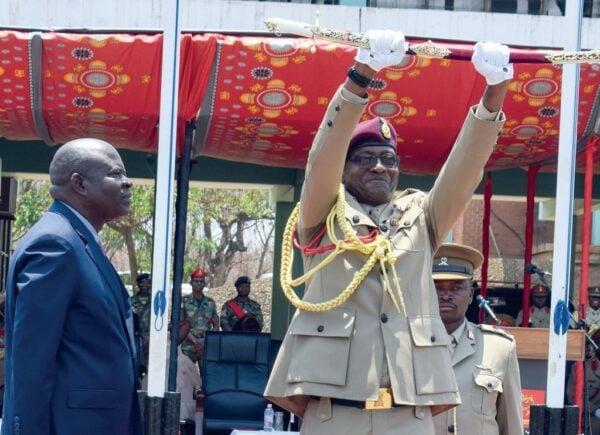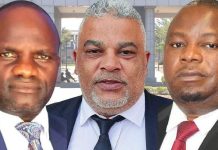Africa-Press – Malawi. Pressure from politicians continues to haunt the Malawi Defence Force (MDF), with its top brass often forced to defend the institution’s integrity against political and corporate meddling — particularly in the recruitment of soldiers and internal operations.
Outgoing MDF Commander General Valentino Phiri lifted the lid on the deep-seated problem during a handover ceremony at Kamuzu Barracks in Lilongwe, where he passed the Sword of Command to his successor, General George Jaffu.
Phiri’s candid remarks exposed what many have long whispered about — that successive MDF commanders face unrelenting pressure from powerful figures in the Executive, Legislature, Judiciary, and even the corporate sector, all seeking to influence recruitment and decision-making in the military.
“During my tenure, some powerful individuals tried to push me to recruit certain people or make particular decisions. But I refused,” said Phiri. “I ensured that only those who deserved to serve were recruited.”
His comments, though measured, struck a sensitive chord within Malawi’s political establishment — long accused of treating the military as a political tool rather than a professional institution.
Sources within the MDF, speaking on condition of anonymity, say every commander in recent memory has battled quiet but persistent political pressure — from the ruling elite, business moguls, and other power brokers who view military recruitment as an opportunity to reward loyalists or family members.
“The pressure starts from the top — some politicians even send lists of names to the barracks, insisting those individuals must be considered,” said one senior officer. “Commanders who resist are sidelined or smeared.”
Phiri, who retires after 45 years of service, said the most difficult moment of his tenure was overseeing the MDF during the recent elections, when political tensions were high.
“I wanted to deliver peace and prevent chaos. We developed a strategy to pacify all stakeholders so that the elections could be free and fair,” he said.
He urged his successor to safeguard the military’s independence and focus on modernising the force, particularly the Air Force, to deal with emerging threats such as cyber warfare and cross-border crimes.
In his inaugural remarks, General George Jaffu, the 18th Chief of Defence since independence, pledged to continue defending the MDF’s neutrality and professionalism.
“We will ensure that illegal mining, illegal entry, and other security threats are contained. Our soldiers must be well-trained and ready for modern warfare,” Jaffu said.
Yet, behind the ceremony’s pomp lies a growing concern — that the MDF’s autonomy is eroding under mounting political pressure.
Security analysts warn that unless the trend is curbed, Malawi risks turning its army into a politically compromised institution, unable to uphold its constitutional duty of protecting the nation without fear or favour.
“The MDF has long been one of Malawi’s most trusted institutions,” one analyst noted. “But continued political interference — especially in recruitment — threatens that reputation. The military must serve the nation, not politicians.”
Phiri’s farewell may have been dignified, but his words were a pointed reminder: the fight to keep politics out of the barracks is far from over.
For More News And Analysis About Malawi Follow Africa-Press






